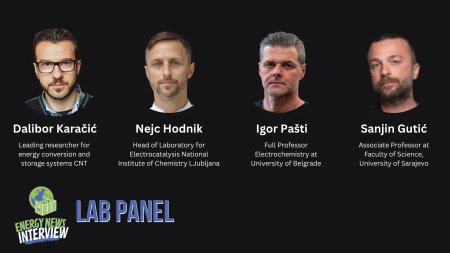The European Union’s strong interest in green hydrogen, as seen by its plan to import up to ten million tons by 2027, calls into question the Union’s policy.
The European Commission’s plan was developed in response to Russia’s invasion of Ukraine in an effort to remove Europe’s reliance on Russian gas and supply substitute energy sources that could guarantee the continent’s energy security. The fight to abolish the Russian gas monopoly is costly because it helps to establish and consolidate new geographic areas where this energy is gathered, such as North Africa.
The plan to import hydrogen from North Africa has a number of issues, according to a report by the International Institute (TNI) and the European Enterprise Observatory (CEO), as high production and transportation costs show that European ambition is unsustainable in comparison to planned targets. The intermittent nature of these renewable sources, on the other hand, means that green hydrogen will not be created nonstop around the clock even if renewables may still be employed to produce it. As a result, it is anticipated that the hydrogen reactors will be linked to the primary electrical grid, which typically runs on fossil fuels. A photovoltaic plant, for instance, can only produce between 24 and 27% of its theoretical capacity because the sun only illuminates it for half the day and its rays are weakest in the morning and just before nightfall.
In this regard, the project to build a green hydrogen plant with a capacity of one gigawatt of solar energy in Algeria by the Italian multinational company (ENI) raises several challenges, as it intends to provide only about 0.2% of Algeria’s energy exports in the form of gas. Algeria will need to install 500 gigawatts of solar panels—more than a thousand times the amount currently available—if it switches from exporting gas to hydrogen. Along with the extraordinarily high production costs, there will be a significant impact on how land, water, and other fundamental resources are used.
As the process of transporting hydrogen requires significantly more energy than that required to carry fossil fuels, the expenses of doing so are likewise prohibitive. Green hydrogen exports via sea tankers are most likely to come from Egypt and Morocco. The energy required to liquefy natural gas is three times greater than the energy required to transport green hydrogen by marine tankers, and the quantity of energy in the gas delivered is only 27% of the energy in the same amount of natural gas. In addition to their known toxicity, green gases such as methanol and ammonia created from green hydrogen are being investigated by Egypt as potential replacements for present maritime fuels. However, the cost of these green gases is 4-5 times more than that of current fuels.
Therefore, the cost of producing and transporting hydrogen is a huge concern. When the hydrogen produced in North Africa is used to supply the European Union’s energy demands, the cost becomes even more concerning. It might cost up to 11 times as much for Europe to consume hydrogen from North Africa as opposed to natural gas. Here, the question of who will cover these expenses must be asked.
The increased interest in green hydrogen in the EU could be seen as a backdoor for the gas business or a trojan horse for the continued use of fossil fuels. The EU contends that other types of “low carbon” hydrogen, also referred to as “blue” hydrogen and positioned as a “transition fuel” to green hydrogen, can still be used and are created from gas with carbon dioxide trapped and stored underground. It should be emphasized that just 1% of the hydrogen produced in Europe at the moment is eco-friendly. It’s also important to note that using blue hydrogen has a greater negative impact on the environment than using green hydrogen alone. Therefore, European gas corporations are attempting to spread misinformation about the hydrogen economy in order to justify the usage of hazardous forms of hydrogen in the event that there is a shortage of renewable electricity. The European Union (or the entire world) would thereafter be forced to rely on blue hydrogen as a result of demand outstripping the quantity of renewable electricity required for “green” hydrogen. What was intended to be a “transition fuel” might essentially turn into a “final destination fuel” in this way.
Ursula von der Leyen, president of the European Commission, announced in her recent State of the European Union address that the European Union will establish a €3 billion European Hydrogen Bank, which is intended to fill the initial gaps between production costs and selling prices, in order to provide significant public funding to cover the rising costs of hydrogen. This choice sparks a heated discussion on the value and utility of obtaining such cash at a time when the European continent is experiencing a crisis with skyrocketing living expenses and energy prices. Wouldn’t the increased programs to tackle energy poverty and improve living conditions be the most worthwhile investment?
Let’s assume, however, that the EU can fully subsidize consumer expenditures. Then, rather than meeting Europe’s energy demands, one may wonder if it would be sensible for nations like Morocco, Algeria, and Egypt to secure their own renewable electricity and climate targets. Many major corporations in Europe, including Vitol, Eni, and Siemens, to mention a few, claim to be producing and exporting hydrogen from North Africa using public funds. The push for green hydrogen is a prime example of the neo-colonial exploitation of resources, made possible in part by the collaboration of European politicians and multinational corporations with local elites.
It is important to note that the European Union is interested in the hydrogen on a global scale, not just in North Africa. In order to satisfy its own requirements, the European Union seeks to establish a global hydrogen market, using the pretense of global equitability and sustainability as a smokescreen. South Africa and Chile are among the nations impacted by Europe’s search for green hydrogen. The campaign for additional free trade agreements targeted at importing hydrogen also amply demonstrates that one-sided commerce, or trade from the periphery to the center, actually exists behind the rhetoric of mutual cooperation. Free trade agreements have a negative impact on society, the environment, and the economy. Would it be just if people and communities had to watch while the EU’s green hydrogen megaprojects ruined and seized control of their lands and waters? The threat posed by predatory extractivism on the one hand and by local communities on the other is made worse by European corporate profit-making. Therefore, European industry strives to legitimize its imports while strengthening the standing of the European Union on the global stage rather than paving the road for truly sustainable development.
The EU must categorically give up its illusory plans to import hydrogen and instead refocus on those promising investments in renewable energies and energy efficiency in a fair and equitable manner if it wants to completely break with the neo-colonial energy paradigm based on the subjugation of the people of the South.








